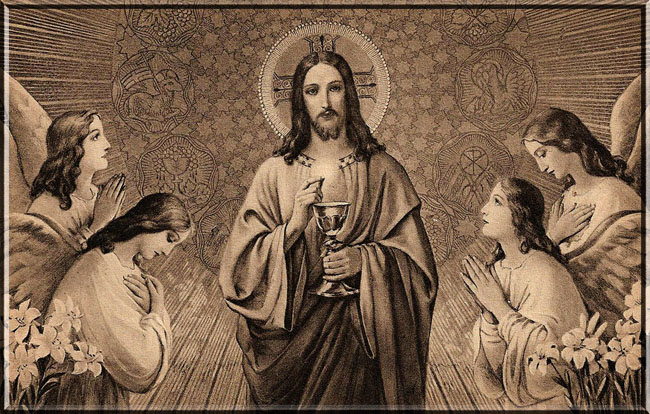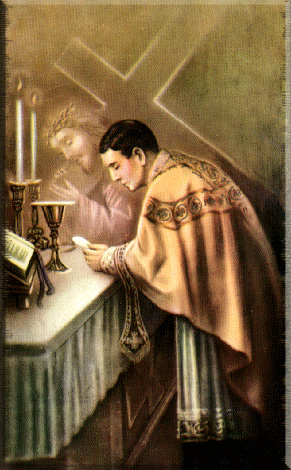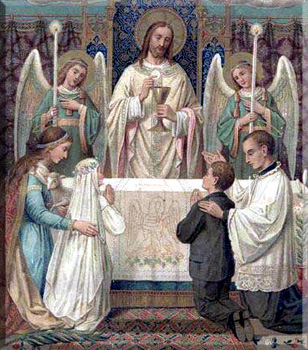 Sunday within the Octave of Corpus Christi by Fr. Francis Xavier Weninger, 1877 "And they began all at once to make excuses."--Luke 14.
The Church reads today the Sunday within the Octave of Corpus Christi a Gospel, which points
not only to the table which Jesus, by the institution of the most holy Sacrament, has set for the children of His Church, but also to His great desire that they may all draw from this inexhaustible fountain of all graces the merits of the Redemption, to sanctify their lives
and to secure for all eternity the salvation of their souls.
Indeed, we need not hesitate to say that the entire life of the children of the Church, if it is to be a truly Catholic life, depends on their benefiting by the presence of Christ in the most holy Sacrament, as was acknowledged so clearly and distinctly by the apostolic Christians. The holy Eucharist is a source of grace to us in three ways. It is, namely, first a sacrifice; secondly, a banquet; and, thirdly, the Sacrament of Christ's presence among us here upon earth. Unfortunately, so many children of the Church are inconceivably indifferent to the presence of Christ in the Most Holy Sacrament, and do not benefit by it as they should, they excuse themselves. Let us consider, in order, the emptiness and frivolity of these excuses. I shall speak today, especially, of the high regard we should entertain for Holy Mass, and of the fervor that should animate us to derive from the holy sacrifice great fruit for our salvation. Mary, thou who didst most highly esteem the presence of Christ, and most wisely benefit by it, increase in our hearts love and devotion to Jesus, especially in that character in which, as the sacrifice of the New Testament, He is offered to God upon our altars! I speak in the most holy name of Jesus, to the greater glory of God! The first relation of Christ to us in the Most Holy Eucharist, is that of a sacrifice. Through the transubstantiation effected at Mass, Christ sacrifices Himself always anew upon the altars of the Church to His heavenly Father, and thus becomes the sacrifice of the New Testament, which, according to the words of the Prophet Malachias, would be offered to God over the entire earth "from the rising to the setting of the sun," and until the end of time. Let us consider, especially, two points; namely, esteem for this holy sacrifice, and participation in its fruits. Both of these points deserve the greatest attention, as they relate to the essential part ot external worship, namely, sacrifice, and to the countless graces which flow from this sacrifice to those who share in its fruits. I say, first: The Most Holy Eucharist relates to the essential part of the external worship of God. The reason lies in the fundamental character of a sacrifice. The offering of sacrifice has been recognized since the creation of mankind by all nations of the earth, as an expression of devotion, and the highest and most proper way of worshiping God. Abel and Cain already offered sacrifices, and these were; surely preceded by Adam. The Patriarchs brought sacrifices, and so did Melchisedech and Job. But we see also among all nations countless temples and altars, and the sacrifice which was offered there was at all times regarded as the highest act of the worship of God. And when God chose from among the human races a nation to prepare for the coming of the Messiah, He gave Moses manifold and minute commands in regard to the offering of sacrifices. He glorified, by a visible sign of His presence, the temple which Solomon had built, in order to give a special sanction to the sacrifices offered there by priests, forming a cast by themselves and separated from the people. All these sacrifices, however, were only figures of that sacrifice which, according to the command of Christ, is offered upon our altars, and which, in overflowing fullness of graces, exceeds all its prototypes. To recognize this truth we need only think:  First: Who it is that offers, and what is offered, and in what way and manner. He who makes the offering in the person of the priest is Christ Himself, the incarnate Son of God. As St. Ambrose rightly remarks, the words of the transubstantiation remind us of this. The priest does
not say: "This is the body this is the chalice of His blood;" but he says: "This is my body this is
the chalice of my blood," as if Christ Himself were speaking. Yes, indeed, it is Christ Himself, Who, through the words of transubstantiation uttered by the priest, offers the sacrifice to His heavenly Father.
First: Who it is that offers, and what is offered, and in what way and manner. He who makes the offering in the person of the priest is Christ Himself, the incarnate Son of God. As St. Ambrose rightly remarks, the words of the transubstantiation remind us of this. The priest does
not say: "This is the body this is the chalice of His blood;" but he says: "This is my body this is
the chalice of my blood," as if Christ Himself were speaking. Yes, indeed, it is Christ Himself, Who, through the words of transubstantiation uttered by the priest, offers the sacrifice to His heavenly Father. Catherine of Bologna saw one day at Mass which was read by her confessor, St. Raymond at the moment when the priest took the host in his hand, two persons standing before the altar on the same spot St. Raymond and Christ in him. She saw at the elevation of the host, in the hands of the priest, the hands of Christ with the marks of His wounds! That which St. Catherine saw with, her bodily eyes, we see at every Mass with the eyes of faith. And what is offered? Christ Himself lies upon the altar a victim, veiled in the sacramental species. This transubstantiation of bread and wine into the body and blood of Christ is, according to St. Augustine, an infinitely greater miracle than the creation of the world, which God called into existence by the words: "Let there be light!" Then Omnipotence called finite beings into existence now the Creator Himself appears at the word of a creature of the priest. And how perfectly this sacrifice which Christ makes of Himself includes all the acts of worship which distinguish sacrifices, as, for instance, praise, adoration, thanksgiving, petition and atonement! The reason is, that Christ is both priest and victim, and that by the personal union in Him of the word with the human nature, all His actions have an infinite value. No pure creature nor any number of creatures could make; an offering of equal value. The praise of the angels continued from the moment of their creation through the ages of all eternity, the praise of all the saints, their adoration, their thanksgiving, their prayers and intercessions all vanish in comparison with the adoration, praise, thanks, prayers and atonement which, in one holy Mass, Christ offers to His heavenly Father. It is the sacrifice of the Mass that, like a sun, pierces and illumines the whole service of God, that gives our homage its highest meaning and makes it worthy of the Most High; it is to this sacrifice that all the grades of holy Orders have reference, by which the servants of the sanctuary are raised step by step to the dignity of the priesthood. The Church explains all that we have to consider in this matter when she says, that Mass is the same sacrifice which Christ offered for us upon the cross, with only this difference, that it is not a bloody sacrifice. What a sight, what an impulse to praise and exultation must it not be for the angels when they look down upon the most holy Sacrament, which at every moment, in some part of the earth, is raised to heaven by the oblation of priests, to give thanks and praise to God, and to reconcile us to Him through our Lord Jesus Christ! But if this is the case, oh how eager every child of the Church should be to assist daily, if possible, at holy Mass, and to unite his praise, adoration, prayer and atonement with the praise, adoration, prayer and atonement of Christ! How fortunate we should deem ourselves that we are permitted to assist at the offering of this sacrifice, and as the Church desires and demands of the faithful during Mass to unite our acts and prayers spiritually with those of the priest! It is for this reason that St. Peter calls the Christians a sacerdotal people, although priests alone are permitted to say Mass. How sad to think that so many children of the Church do not value this sacrifice, yes, do not even seem to understand it, and, therefore, do not endeavor to assist as often as possible, even daily, at Holy Mass, but must be forced by the commandment of the Church to hear Mass at least on Sundays and holydays! And even on these days, not a few stay away through shere carelessness or indolence, and others, make the slightest inconvenience a pretext for absenting themselves. But of those who assist at Mass, many by their willful distractions, their idle curiosity, their disrespectful behavior, offend God, even though they fulfill the command of the Church. We can maintain, on the contrary, with certainty, that those whoever they may be that endeavor to assist every day devoutly at the Mass, will lead, in other respects, too, the life of true children of God, and walk the path of salvation without hesitation. Hence, how becoming, how profitable would it be if out of every family in the congregation, at least one member assisted each day at Mass! Streams of heavenly grace would then pour from the altar upon the whole congregation, conveying blessings for time and eternity, through Jesus Christ our Lord! Amen!
If in mortal sin, the Church calls on you to repent, and by a sincere and contrite confession be reconciled to God, and then approach the blessed Eucharist, otherwise you commit a sacrilege. The only condition which our Lord requires for admission to His holy table, is to be in a state of grace, and to have a desire to receive Him. 
Prayer which may be said some days before Communion
O Lord Jesus Christ! whom I aspire to receive in a few days within the temple of my soul, I come to implore that Thou wilt Thyself prepare Thy destined abode, cleansing it from every stain, and enriching it with ornaments worthy of Thy presence. Grant me an increase of faith, hope, and charity; grant me true contrition, and profound humility; grant me to sigh with holy Simeon for Thy coming, and, like him, to centre in Thee alone the ardent affections and fervent desires of my heart. O Lord! whose throne is surrounded by cherubim and seraphim! whose presence is felt by all creation, whose spotless sanctity the angels themselves contemplate with awe, I acknowledge my extreme unworthiness to receive Thee; but animated with lively confidence in Thy paternal goodness, I conjure Thee to prepare me Thyself, and to supply from the treasury of Thy abundant mercies for all my deficiencies. O Thou who hast come on earth to save me, and who by Thy sufferings hast opened heaven to receive me, grant me grace to profit by all Thou hast done and endured for my salvation! Amen
Aspirations which whould be used the Days Preceeding Communion
As the wearied hart pines for the refreshing water, so does my soul thirst for Thee, O Lord!
http://catholicharboroffaithandmorals.com/My soul sighs for the possession of God; when shall I come and appear before Him? Lord, I come to Thee; but how shall I prepare the way for Thee? I am not worthy that Thou shouldst enter under my roof; say but the word, and my soul shall be healed. How can I receive Thee into a heart so full of iniquities, and yet how can I abstain from the living Bread come down from heaven to give life to the world? Have pity, I beseech Thee on me, a sinner; and deign to prepare Thyself a dwelling in my heart; grant that from Thy adorable body may proceed a virtue to give strength and life to my soul. Prepare me for Thyself, O Jesus! and render me worthy of Thy visit; look on me, O Lord! and inflame me with Thy love; that I may run after the odor of Thy perfumes. Grant me humility of spirit, and pure charity, to render me worthy of participating in the blessed food of heaven. I wish to attract Thee by my love, and to enjoy Thy presence in the centre of my soul. O my God! my life! my all! I beseech Thee to come into my heart, and to unite me to Thyself forever. |